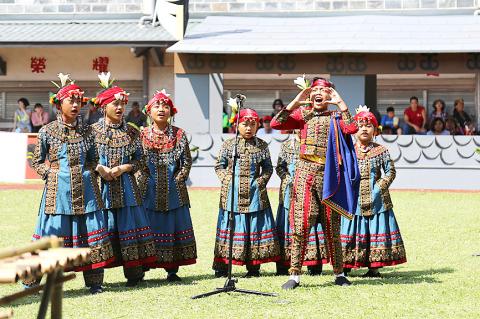The success of Aboriginal choir groups over the past few years at numerous international events shows the success of programs teaching Aboriginal languages and gives Aborigines hope that their customs and traditions will not vanish, a Pingtung County Government official said.
Not having developed their own writing systems, Aborigines have relied on the use of songs to pass down tribal wisdom — customs, rites and traditions — from generation to generation, the official said.
However, the songs were themselves dry and uninteresting to younger generations and were in danger of being lost, the official added.

Photo: Chiu Chih-jou, Taipei Times
Taiwu Ancient Ballads Troupe founder and instructor Camake Valaule said that efforts to find old songs and conserve them were abandoned for at least a generation.
“Even the elders sometimes say that learning about the old songs is not worth it,” Camake said.
Cingyeh Elementary School choir instructor Tang Hsiu-yueh (唐秀月) echoed the concern, saying that if children are not taught their native language at a young age, soon no one would know how to sing the songs anymore.
Efforts to promote Aboriginal language education for children within the nation are helping to mitigate the danger, Pingtung County Bureau of Cultural Affairs Director Wu Li-hua (伍麗華) said.
The bureau and other organizations have conducted many field studies on the Paiwan and Rukai languages, the two most prevalent Aboriginal languages in the county, Wu said.
The county spearheaded the movement of starting Aboriginal choir groups, encouraging a shift from using the bel canto method of singing the songs of other groups to having elementary-school choir groups sing their own Aboriginal songs as the songs were meant to be sung.
As a result, many Aboriginal choir groups — including the Taiwu Ancient Ballade Troupe, the Cingyeh Choir and the Puzangalan Children’s Choir — have allowed the world to see the “real” Taiwan.
Puzangalan Children’s Choir instructor Wu Sheng-ying (吳聖穎) said that the choir included a Paiwan song in its performance last week at the 11th International Johannes Brahms Choir Festival and Competition.
The choir won first place in the Children’s Choirs category, as well as placing second in the Folklore category and fifth in the Sacred Choral Music a capella category.
Tang said that those in the choir at Cingyeh Elementary School have become more confident about their Aboriginal culture over the past few years after discovering that the songs of their ancestors are appreciated by others in the world.
The older generation now has hope that customs and traditions will be passed on, Camake said.

Alain Robert, known as the "French Spider-Man," praised Alex Honnold as exceptionally well-prepared after the US climber completed a free solo ascent of Taipei 101 yesterday. Robert said Honnold's ascent of the 508m-tall skyscraper in just more than one-and-a-half hours without using safety ropes or equipment was a remarkable achievement. "This is my life," he said in an interview conducted in French, adding that he liked the feeling of being "on the edge of danger." The 63-year-old Frenchman climbed Taipei 101 using ropes in December 2004, taking about four hours to reach the top. On a one-to-10 scale of difficulty, Robert said Taipei 101

Nipah virus infection is to be officially listed as a category 5 notifiable infectious disease in Taiwan in March, while clinical treatment guidelines are being formulated, the Centers for Disease Control (CDC) said yesterday. With Nipah infections being reported in other countries and considering its relatively high fatality rate, the centers on Jan. 16 announced that it would be listed as a notifiable infectious disease to bolster the nation’s systematic early warning system and increase public awareness, the CDC said. Bangladesh reported four fatal cases last year in separate districts, with three linked to raw date palm sap consumption, CDC Epidemic Intelligence

Taiwanese and US defense groups are collaborating to introduce deployable, semi-autonomous manufacturing systems for drones and components in a boost to the nation’s supply chain resilience. Taiwan’s G-Tech Optroelectronics Corp subsidiary GTOC and the US’ Aerkomm Inc on Friday announced an agreement with fellow US-based Firestorm Lab to adopt the latter’s xCell, a technology featuring 3D printers fitted in 6.1m container units. The systems enable aerial platforms and parts to be produced in high volumes from dispersed nodes capable of rapid redeployment, to minimize the risk of enemy strikes and to meet field requirements, they said. Firestorm chief technology officer Ian Muceus said

MORE FALL: An investigation into one of Xi’s key cronies, part of a broader ‘anti-corruption’ drive, indicates that he might have a deep distrust in the military, an expert said China’s latest military purge underscores systemic risks in its shift from collective leadership to sole rule under Chinese President Xi Jinping (習近平), and could disrupt its chain of command and military capabilities, a national security official said yesterday. If decisionmaking within the Chinese Communist Party has become “irrational” under one-man rule, the Taiwan Strait and the regional situation must be approached with extreme caution, given unforeseen risks, they added. The anonymous official made the remarks as China’s Central Military Commission Vice Chairman Zhang Youxia (張又俠) and Joint Staff Department Chief of Staff Liu Zhenli (劉振立) were reportedly being investigated for suspected “serious